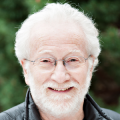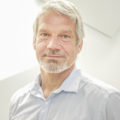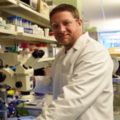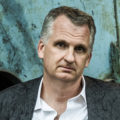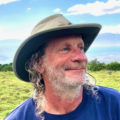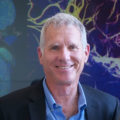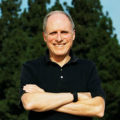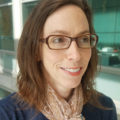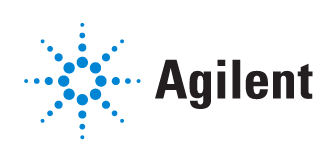2022
Knowledge and Values from Molecules to Public Policy
-
Knowledge & Values: Medicine and Public Health
-
Welcome to the 13th Annual GoldLab Symposium
Chairman and Founder of GoldLab Foundation, Larry Gold, gives his opening remarks.
-
Why DNA Matters for Social Equality
For several years now, scientists have shown that DNA makes us different in ways that matter: for our personalities, our health, and our educational and economic success. Presenting the research that led to her book The Genetic Lottery, Kathryn Paige Harden introduces readers to the latest genetic science, dismantling dangerous ideas about racial superiority and challenging us to grapple with...
-
Why Do Newborns Die and What Can We Do About It? Shift Focus From Pathogen to Host
Newborn death due to infection remains one of the biggest threats to life across the human life span and across the globe. Vaccination can save millions of lives every year, but vaccines given to newborns a) induce protection too late, and b) do not cover the many pathogens that can infect newborns. We need to change our approach to begin...
-
Exploring Cardiovascular Physiology to Uncover Novel Therapeutic Strategies Using Human Inducible Pluripotent Stem Cell Derived Cardiomyocytes and Human Engineered Cardiac Tissues
Building more relevant human model systems to explore complex cardiovascular biology is essential as we work to uncover new therapeutic treatment options for heart failure. Dr. MacDonnell will share the rationale and development of human-based cardiac cellular and tissue model systems.
-
Muscle Adaptation Gone Wrong – How Duchenne and Becker Muscular Dystrophy Cause Amplified Muscle Damage Revealing a Novel Therapeutic Target
The human body has evolved with an ability to rapidly adapt to physical challenges by allowing controlled injury and repair of skeletal muscle as a way to increase muscle size and strength. Different skeletal muscle fiber populations exhibit different thresholds for this type of remodeling with an aim towards maximizing the speed of adaptation while minimizing the potential for detrimental...
-
Antarctica and Sea Level Rise: We’re In This Boat Together
Using satellite data of the polar ice caps allows CIRES to map these regions in new ways, and study the effects of climate change in Antarctica. This data has witnessed the collapse of ice shelf areas and glacier acceleration in the Antarctic Peninsula, ice streams of the Ross Ice Shelf, and wind-snow interactions on the East Antarctic Plateau. A recent...
-
Navigating in a White World at the Bottom of the Earth
Leilani Raashida Henry is the author of the book The Call of Antarctica: Exploring and Protecting the World’s Coldest Climate. She utilizes the diaries of her father George W. Gibbs, Jr., the first person of African descent to set foot on the continent of Antarctica, to explore this beautiful and desolate part of the world. Leilani will talk about the expedition on which her father served (Admiral Byrd III), the continent itself, and its importance to the global environment.
-
Pricing Drugs for Innovation and Affordability
Drug prices need to be high to finance research and development but low to ensure affordability and access. Attempts to balance these conflicting imperatives are bedeviled by scientific uncertainty as to product effectiveness at the time of initial launch and the subsequent evolution of clinical evidence. The combination of multiple goals and scientific complexity creates one political firestorm after another,...
-
Reflections on Current Events in Ukraine
Tim Snyder reflects on the state of the conflict in Ukraine and his view on the importance of the outcome for the rest of the world.
-
-
Knowledge & Values: Humans and Computers
-
Opening Remarks
Larry Hunter gives the opening remarks for day 2 of the 13th Annual GoldLab Symposium.
-
RNA Abnormalities in Human Diseases and How They Might Be Corrected
RNA molecules, and their regulation, are central to the functioning of human cells. Moreover, abnormalities in RNA regulation can lead to human disease. For example, in bone marrow failure diseases, such as dyskeratosis congenita, the telomerase RNA required for chromosome maintenance is abnormally degraded. Understanding this degradation mechanism has suggested possible therapies to reverse this process and provide treatment...
-
Structure-based Discovery of Small Molecules that Disaggregate Tau Fibrils from Alzheimer’s Disease
Failing the development of effective drugs for Alzheimer’s disease (AD), millions are destined to die with dementia. AD is the consequence of neuronal death and brain atrophy associated with the aggregation of protein tau into fibrils. This suggests that disaggregation of tau fibrils could be a therapeutic approach to AD. The capacity for the polyphenolic small molecule EGCG, abundant in...
-
If We Cannot Count Rare Disease Patients, They Will Not Count
The phenotypic, genetic, and environmental characteristics that define a given disease are established in different demographics, regions, contexts, and databases. Different knowledge sources model the attributes of a disease and their relationships differently. For example, one resource may include the variant-to-disease association, whereas another records only the phenotypic features and their onset associated with the disease. Further, patients are an...
-
The Theoretical Acceleration in Identification of Protein Structures
Knowledge of protein structure significantly aids in the investigation of macromolecular function, interactions, and biochemical pathways. It also impacts our understanding of human disease, and the development of therapeutics.
Major developments in both modeling and experimental determination of protein structure are dramatically changing the landscape of structural biology. First, advances in the utilization of multiple sequence information using coevolution...
-
Carbon Versus Silicon: Professional Ethics
The revolutions in biotechnology (CRISPR and genetic editing) and information technology (artificial intelligence) call into question nothing less than what it means to be human and the place of humans in the natural world. Rapid acceleration on the technological frontier makes it less likely that democratic regulation will be up to the task of installing sensible guardrails so that these...
-
The Calamity Prayer: Computational Spiritual Support as a Whole-Human Centered Approach to Healing
In the literature and practice of medicine, especially chronic, palliative, and end-of-life care, spirituality and spiritual care are known to be of fundamental importance to patients’ wellbeing. Yet the healthcare institution is ill-equipped to provide affordable and equitable access to sufficient spiritual and mental health care for all patients. With ever-rising rates of mental illness, overdose, and suicide in a...
-
Chasing My Cure: Lessons Learned as a Physician-Researcher-Patient-Advocate
David will share about his journey from fighting for survival against idiopathic multicentric Castleman disease (iMCD) during medical school to conducting research leveraging the SOMAscan proteomic platform and ultimately collaborating with dozens of physicians, researchers, and patients to accelerate progress for Castleman disease patients worldwide. His presentation highlights the incredible power when patients, physicians, advocates, researchers, caregivers, biopharmaceutical companies, and...
-
Closing Remarks
Larry Gold gives the closing remarks for the 13th annual GoldLab Symposium.
-





